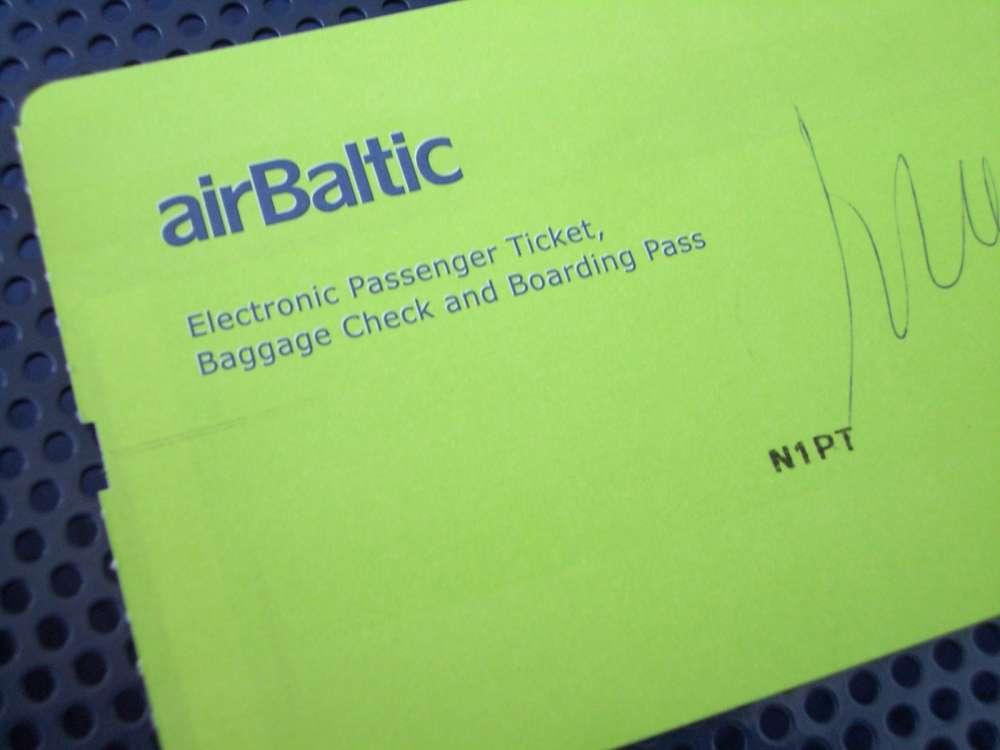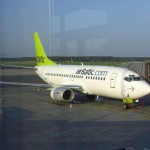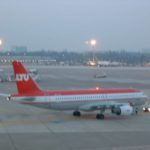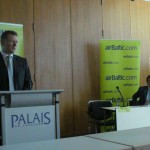Bei ihrem Besuch in Riga verwies die deutsche Bundeskanzlerin besonders auf die Wachstumserfolge der baltischen Airline Air Baltic
Riga – Bundeskanzlerin Angela Merkel hat während ihres Besuchs in Lettland besonders die Fluggesellschaft Air Baltic hervorgehoben. Diese konnte in einer Zeit, in der die Luftverkehrsbranche weltweit herbe Einbrüche erlebte, deutlich wachsen. Auf dem Deutsch-Lettischen Wirtschaftsforum betonte Merkel, dass Air Baltic eine lettische Erfolgsgeschichte sei, die auch für Deutschland ein Beispiel sein könne. Die Airline war das einzige Unternehmen, das die Bundeskanzlerin während ihres Besuchs des Forums erwähnte.
Angela Merkel über Air Baltic: „Riga hat sich als Drehscheibe im internationalen Flugverkehr in den vergangenen Jahren sehr gut entwickelt. Air Baltic hat eine Erfolgsstory bzw. – um in der Luftfahrtsprache zu bleiben – wahre Höhenflüge erlebt. Ich denke, dass das auch eine nachhaltige, kontinuierliche Entwicklung werden kann, wenn die Krise gemeinsam überwunden wird. Das scheint ja Schritt für Schritt der Fall zu sein.“
Foto: Carstino Delmonte/ Touristikpresse.net
Videoquelle: Youtube.com
airBaltic highlights
Record pre-tax profit in 2009 – EUR 20 million
Airports served S2010– 80
Regions served – Europe, Russia/CIS, Middle East
New routes summer 2010 – 27 (No 1 flag carrier in Europe by new routes)
Aircraft 2010 – 34 (forecast for 2013 – 44)
Passengers 2010 – 3.5 million (forecast)
Home base – Riga, Latvia
New airBaltic Training centre in 2010
A successful LIVE Riga citybrand
Creation and development of the North Hub Riga concept
European Airline of the Year 2009/10
ATW Phoenix Award 2010 (Oscar in aviation industry)
Baltic Countries have been hit extremely hard in the current economic crisis. The economies started to slow down in Q1/2008. airBaltic recognized this very early on and has changed it business model completely in two IATA schedule seasons. Over late 2008 and early 2009 the airline has moved from being a point-to-point Low Cost carrier to being competitive network carrier within Europe and connecting EU countries with the CIS countries.
The success can only be measured by the numbers. airBaltic has grown by leaps and bounds in Scandinavia and the Baltics, whilst the general market has collapsed. airBaltic’s home market in Latvia was hit particularly hard. Contrary to the conventional trend, the airline boosted passenger growth at its home base in Riga in a slowing economy with GDP shrinking more than -18% on average over 2009.
Furthermore, airBaltic’s growth was the driving force for Riga Airport’s passenger increase in an environment where all other airlines were shrinking.
With Riga Airport as the country’s only international airport, Latvia ranked the fastest growing European nation in 2009 in airline passenger growth, and the only growing EU member state in aviation, with 10.2% traveller numbers up, according to Eurostat.
*Source: anna.aero
The success is contributed to the new business model (network carrier) and the network structure that was built to support the new direction of the business since 2008, with subsequently increasing share of transit passengers (see chart).
With a constantly growing share of transit passengers and increasing customer base outside its home country, airBaltic is one of the largest exporters in the country. The airlines export volume is forecast to exceed EUR 350 million in 2010, and will represent some 8% of the country’s total exports.
The successful business restructuring translated into over EUR 60 million improvement of airBaltic’s pre-tax result (from a EUR 40 million loss in 2008 due to fuel prices to a EUR 20 million pre-tax profit in 2009).
Further capitalisation of the airline by the shareholders through a bond issue exercise added LVL 30 million (EUR 40 million) in capital.
In March 2010 airBaltic opened its training facility airBaltic Training for flight crews. A multitude of training courses is available for airBaltic staff, as well as for other airlines thus adding to the revenue streams of the carrier.
Since early 2009, airBaltic has successfully promoted the North Hub Riga concept to demonstrate the unique geographical location of the Latvian capital to serve as a transit hub between the West and East, North and South. The airlines achievements in reinventing Riga as the North Hub have been recognized by major international aviation publications.
The success of airBaltic has earned international recognition – airBaltic is the European Airline of the Year 2009/10 by ERA and the carrier was given ATW Phoenix Award that has the same value in the airline industry as the Oscar award for filmmakers.





